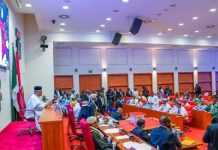Centrally collected revenue shared by the federal, state and local governments slid by N2.8 trillion between 2014 and 2015, a Federal Ministry of Finance report has shown.
Analysis of official documents from the Ministry of Finance shows that the three tiers of government shared N8.6 trillion in 2014 but the figure slumped to N5.8 trillion in 2015 due to the continuous global slide in crude oil prices.
A barrel of crude oil sold for $105.71 in the first quarter of 2014 but plunged to $37.28 in the last quarter of 2015, data obtained from the Central Bank of Nigeria (CBN) shows.
BudgIT, a budget-tracking advocacy group, said in its new report: State of the states, that the three tiers of government were going insolvent for their failure to build adequate fiscal buffers in the past when the crude oil price stood at about $100 per barrel for 42 consecutive months.
Dwindling revenue
In the first quarter of 2014, the Federal Accounts Allocation Committee (FAAC) document showed that N2.1trillion was shared to the federal, state and local governments as follows: N666.3 billion for January, N776.7 billion for February and N720.8 billion for March.
For the second quarter of the same year, N2.6 trillion was shared to the three tiers of government as follows: N685.1 billion (April), N1.1trillion (May) and N851.3 billion (June).
In the third quarter, N2 trillion was shared thus: N731.3 billion (July), N673.1billion (August) and N620.5 billion (September).
For the fourth quarter, N1.8trillion was shared as follows: N610.1 billion (October), N628.7 billion (November) and N580.3 billion (December).
In 2015, the distributable revenue was however reduced to N1.5 trillion in the first quarter: N500.1 billion for January, N567.8 billion for February and N435 billion for March.
For the second quarter, the figure marginally rose to N1.7 trillion – N388.3 billion for April, N418.4 billion (May) and N923.8 billion (June).
For the third quarter of 2015, the revenues further slumped to N1.3 trillion: N521.2 billion (July), N442.6 billion (August) and N389.9 billion (September).
The downturn continued as revenues slipped to N1.2 trillion in the last quarter of last year: N473.8 billion for October, N369.8 billion for November and N387.8 billion for December.
Apart from the monies shared to the federal, states, and local governments within the period, the FAAC disbursement included deductions for the cost of collections by the Federal Inland Revenue Service (FIRS), Nigerian Customs Service (NCS) and Department of Petroleum Resources (DPR) among others.
The federal government allocation dropped by N907.7 billion in 2015, slipping from N3.4 trillion in 2014 to N2.5 trillion in 2015.
The states’ allocation dipped by N500 billion in 2015, changing from N2.0 trillion in 2014 to N1.5 trillion in 2015.
The 774 local government areas’ total allocation dropped by N393 billion in 2015. They got N1.5 trillion in 2014 and N1.1trillion in 2015.
The 13 percent derivation fund shared to the eight oil producing states also dropped from N690.1billion in 2014 to N593.7 billion in 2015.
The oil producing states are; Abia, AkwaIbom, Bayelsa, Delta, Edo, Imo, Ondo and Rivers.
The steep fall in revenue took its toll on the states’ ability to deliver on development programmes in areas such as education, health and roads.












